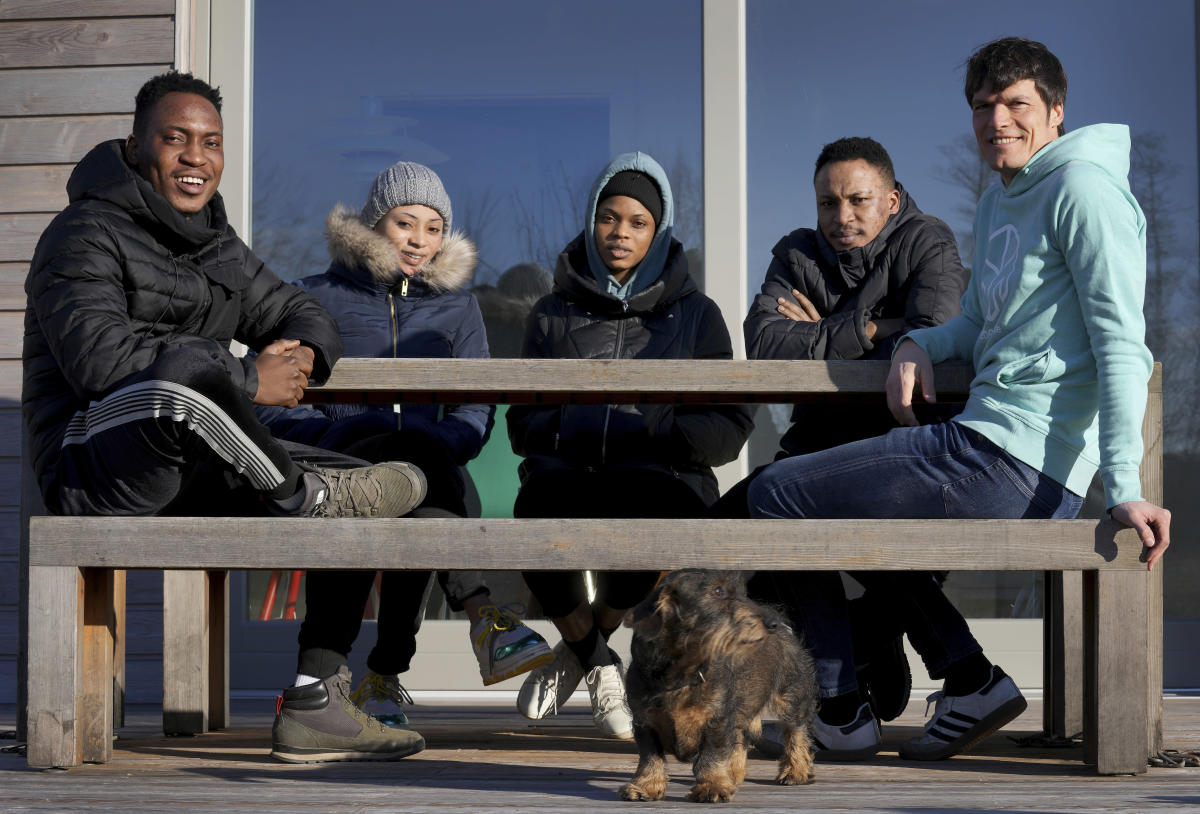
BERLIN (AP) — Emmanuel Oyedele’s dream of getting a business degree in Ukraine lies shattered in the rubble of Russia’s sudden fierce military assault, but right now the 28-year-old Nigerian says he feels blessed.
After hastily escaping Kyiv as Russian forces advanced, Oyedele, his brother and two young female friends spent days trying to flee Ukraine by train and on foot before eventually making it to Berlin, where they were welcomed into a stranger’s home.
“The stress, it’s all gone,” Oyedele said Monday from the lake-side house an hour outside the German capital where the Vollmann family says he and his group can stay until the end of April.
“The only stress I have right now is the sympathy, the sadness in me to see my brothers who are stuck in Kyiv or other regions of Ukraine,” Oyedele told The Associated Press. Aside from the threat of being caught in the fighting, lack of electricity means those left behind are now sleeping in cold apartments, without warm water or any way to cook, he said.
According to the U.N. refugee agency, more than 1.7 million people have fled Ukraine since the start of the conflict, and many more are still trying to get out. Among them are tens of thousands of foreigners, including many students from Asia and Africa who, like Oyedele, had hoped to get a foothold in Europe with a degree in Ukraine.
Reports of non-white people being turned back at the border as they tried to enter Poland prompted Oyedele and his friends to make a lengthy detour via Hungary, from where they were eventually able to get to Berlin.
Christian Vollmann, a tech entrepreneur in his mid-40s, was among hundreds of Germans waiting at the train station Friday night with a sign saying how many people he could take in and for how long.
“I felt helpless and wanted to do something,” Vollmann told AP after he and Oyedele had been paired up by volunteers trying to find homes for trainloads of weary refugees, many of whom were carrying little more than a bag each containing their most precious belongings and documents.
“We are so privileged here,” he said.
Germany took in almost 900,000 refugees in 2015, many of them fleeing wars in Syria, Iraq and Afghanistan. The influx was accompanied by a deliberate effort on the part of many Germans to help the new arrivals integrate, but also led to social tensions and the rise of a new far-right party in the country.
So far, Berlin’s welcome to those fleeing the war in Ukraine has been big-hearted, but the sudden strain is beginning to show.
“It’s very important that people don’t just arrive in Berlin, but also are accommodated in other states so that we can manage it,” Berlin Mayor Franziska Giffey said Monday.
Of the more than 10,000 people arriving in the German capital each day since Friday, the overwhelming majority have found shelter in private accommodation — with friends or volunteer hosts.
Giffey praised the goodwill of Berliners but warned that it likely won’t be a long-term solution.
“If someone clears out their children’s room, they can do that for a while, for one or two or perhaps a few weeks,” she said, but warned that eventually people might need long-term accommodation elsewhere.
Vollmann is convinced he made the right choice taking in Oyedele and his friends. The Nigerians and their German hosts have already spent a night around a campfire drinking beer and getting to know each other.
“It was great to see how grateful they were, how much joy they had and how many plans they’re already making,” Vollmann said.
He hopes the wave of support many Europeans are showing toward those fleeing Ukraine will continue.
“In my view this sends a very strong signal,” Vollmann said. “The more aggression there is, the more solidarity has to come from our side.”
Oyedele, too, has his hopes pinned on Europe.
“I think Germany has a space for me,” he said.
___
AP writer Geir Moulson contributed to this report.




